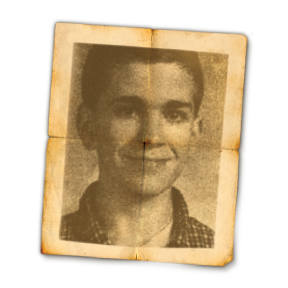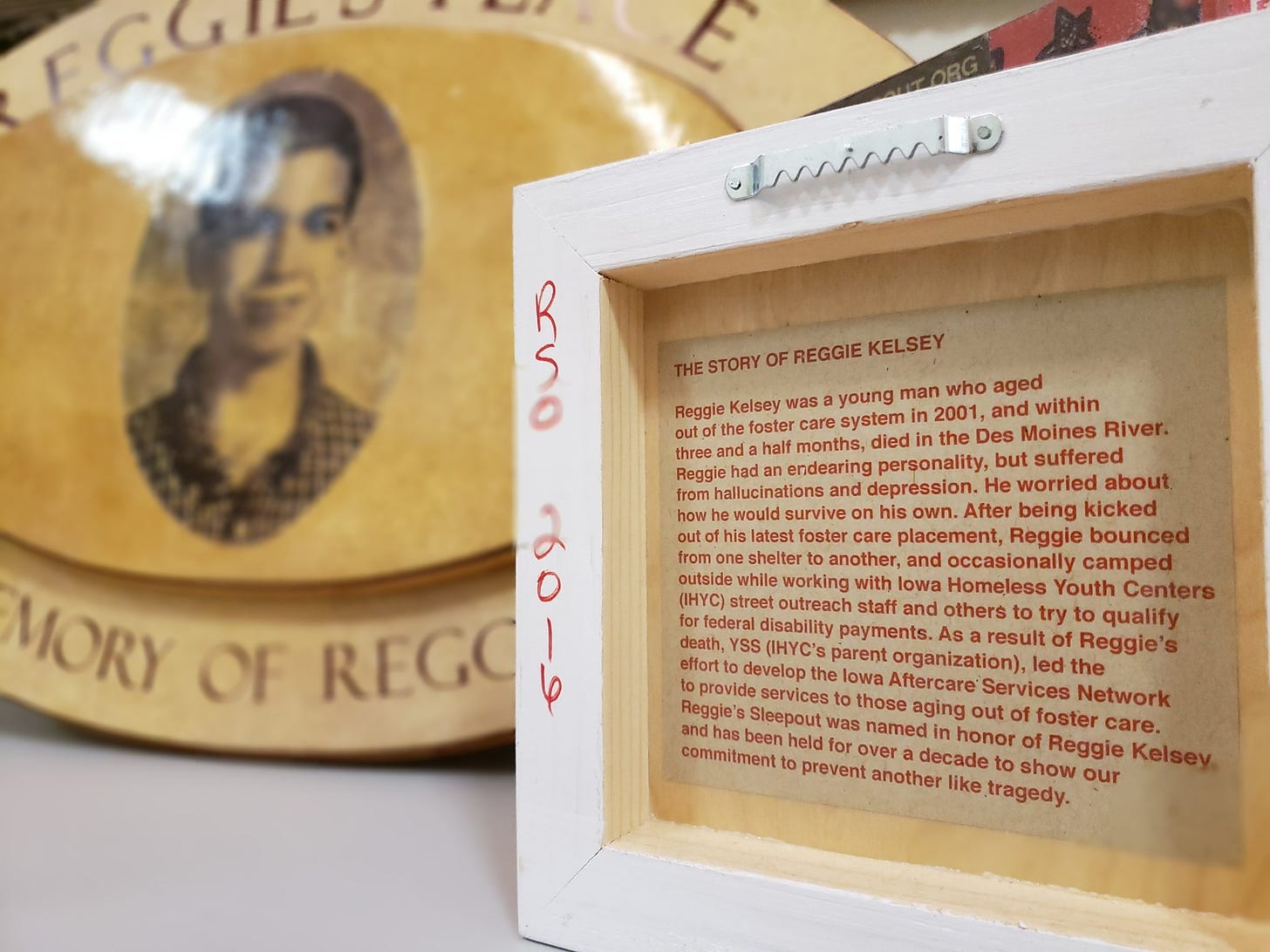This Saturday, October 19, is the 19th year of an event called “Reggie’s Sleepout,” organized by the Iowa Homeless Youth Centers (IHYC) in Des Moines. It’s an annual fall fundraiser that started in 2006, where hundreds of people sleep all night on the field of Drake Stadium, in boxes, tents, and sleeping bags, exposed to the elements as unsheltered individuals do. While one night can never completely replicate what it must feel like to be homeless, it does provide some insight into the lives of individuals and families who don’t have secure housing, or a place to call home. Monetary donations are part of the sleepout, and funds raised go directly toward IHYC programs that assist homeless youth, ages 18-24, in achieving independence and self-sufficiency. To date, they’ve raised over $2 million dollars in Reggie’s honor.
So, who was Reggie?
Reggie Kelsey was a young Des Moines man described as having an endearing personality, a generous and kind spirit, and was a friend to many. While growing up, he was placed in foster care, but in October of 2000, when he was 17 years old, he aged out of the Iowa foster care system and was removed from his placement. He briefly lived in a group home, then in an apartment alone.
With multiple mental health diagnoses, Reggie’s anxieties and behaviors worsened, and he worried about how he would survive on his own. Lonely, with more free time and less supervision, he was caught stealing and burning things in his apartment. He started missing school and breaking curfew.
In early February 2001, Reggie informed the staff at his independent living program he didn’t feel safe in the apartment anymore, and he was discharged with no plan or support. Around the same time, he was expelled from school and never returned. By the time he turned 18, Reggie had nowhere to live, and nowhere to go. He bounced from one shelter to another, sometimes resorting to sleeping on the streets. Without any meaningful treatment for his mental illness, he also reportedly began to suffer from serious depression and hallucinations.
On May 28, 2001, just three months after his 18th birthday, Reggie’s body was found in the Des Moines River. The Deputy State Medical Examiner at the time concluded Reggie died by drowning and reported the manner of death as suicide. An investigative report conducted by the state of Iowa later uncovered information that “clearly indicated Reggie was not ready for independent living” at the time he was discharged from foster care services.
The tragedy drew widespread attention to failures in the system. As a result, in 2002, the Youth Shelter & Services (YSS) led the effort to develop the Iowa Aftercare Services Network (IASN) to provide services to those aging out of foster care. YSS continues to lead the program today, supporting foster care alumni with stipends, resources, technology, and more.
In 2006, IHYC, a YSS organization, started Reggie’s Sleepout and invited hundreds of participants to camp out and support the cause.
Short Life, Long Legacy
I first heard about Reggie’s Sleepout some fifteen years ago from a friend, but I never knew much about his personal story and decided to research it, and learn what I could about him.
There isn’t much information available about Reggie’s short life, mostly just information about his death. I did learn that he has two sisters who have attended and spoken at some of the sleepout events in his memory. He also has several nieces and nephews, one of whom is named after him.
But it was seeing his picture for the first time that really affected me.
He was so young. Just a kid, The face of boy.
And to learn that he’d suffered from a mental illness affected me even more. Suddenly, I didn’t need further details about his life at that time. I completely understood how his life, well-being, and safety completely unraveled in just a few short months, with no aftercare support, and no mental healthcare interventions. Not only was he just a kid when he was kicked out of the foster care system, incapable of living on his own, he was a kid who had an illness that wasn’t being treated. And he died from it.
I’ve interviewed some of the dedicated and caring staff at IHYC, and know how much their aftercare program has made a difference in the lives of young people like Reggie. The effects of his story have helped fill some of the critical gaps for shelter and support services.
Now I hope we can honor the final piece of his legacy by filling critical gaps in the mental healthcare system for young people, by not only giving them a safe place to sleep, but access to meaningful mental healthcare treatment when they need it. ~
If you’d like to learn more about Reggie’s Sleepout fundraising event or make a donation, click here.
988: Mental Healthcare in Iowa is a reader-supported publication. To receive new posts and help support my work, consider becoming a free or paid subscriber. And thank you for the generous support from my new paid subscribers!
I’m a proud member of the Iowa Writers’ Collaborative with my “988” column.
We’re a group of writers from all around the state and contribute commentary and feature stories of interest for those who care about Iowa. Meet our writers and column topics!
And finally, a special invitation for paid subscribers:
Keep reading with a 7-day free trial
Subscribe to 988: Mental Healthcare in Iowa to keep reading this post and get 7 days of free access to the full post archives.






